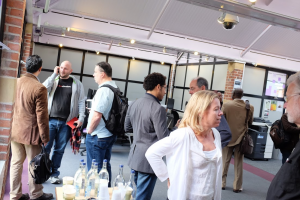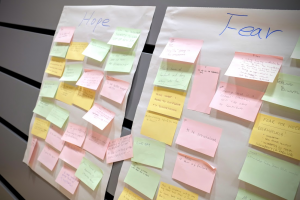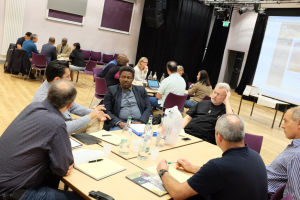It’s Sunday afternoon, and as I sit on the train taking me to Geneva airport, I run through a mental list of things to do during the week. I am headed to York, and more precisely, to York St John University.
I am not the only one headed there – thirty more individuals, from all corners of the world (South Africa, South Sudan, Nigeria, UK, Australia, Zimbabwe, Zambia, Ecuador, Chile, Malaysia, Croatia, UAE, the Netherlands, US, to name just a few) are headed the same way. They are all students in the MA Leadership, Innovation and Change, affectionately known as MALIC, that we at Robert Kennedy College have been running with our partners York St John University so successfully over the past 4 years. One of the RKC students arriving in York this time around is the 600th one to do so since 2011!
Monday morning, 9am – hellos and good mornings all around – recognising some faces from the online profiles – being surprised by others, who are bigger, smaller, younger, older, funnier or more serious than their online personas led me to think.

A week of exchanges and meeting new people
They all have one thing in common though: they are here to learn, and to achieve what for many of them is still a dream for now: a British Master while keeping down their full time jobs in their countries. They are here to work on their dream – the team of lecturers from YSJ are going to take them on a learning journey throughout the week, from the very basic to the very complex issues, with a focus on developing their dissertations. One can see, and sense, a certain anxiety in the air – it is the uneasiness of dealing with the unknown, of not knowing what we do not know. By Friday that will be replaced by a different type of feeling, perhaps expectation and perhaps slight apprehension, for by then they will know more about what they do not know, and realise there is much more to learn still!
Thursday afternoon, 4:30pm – a short debriefing session – the team had shared on Monday their hopes and fears – how many of those have been realised or avoided? …and we are almost through.
.png)
.png)

Hopes and fears
There have been four days of learning, discussions, group work, group fun, and group interaction. Interviews, facilitation, data analysis, coding, socialising and after-hours – these guys (and gals) have spent 4 days that have brought them so much closer than any online experience could. Some speak about that – it feels alone studying online – we want more video conferencing, more interaction – we want more real! Yet they also agree that we have to work within the contraints of what our lives allow us to do while keeping an income and taking care of a family. Perhaps as technology evolves, we will be able to make online education even better – but that is for another day.

Friday morning discussions
Friday morning – we have been building up towards this. Around each table a group of students and a tutor discuss their dissertation ideas, looking for that all elusive “perfect research question”. There is no such thing in reality, and each idea is different. “Our role, both as tutors and peers, is to expose any hidden assumptions and risks that you may not have seen,” I tell them. We keep coming back to our mantra “focus, focus, focus” – “be pragmatic, pick something that is doable, even though you may not be able to save the world” – that too is for another day!
As always, the week has passed by in a haze of ideas, questions, emotions and names and faces that have become more familiar now. I’ll be recognising them as they pass across the stage in the York Minster on graduation day, looking all proud and excited in their graduation gowns. Until then, I have graduation 2015 to look forward to, with 120+ students set to come – how exciting!

Graduation in York
.png)
YSJ’s graduation ceremony must be (and I’m trying to be objective here) one of the most memorable experiences ever – I’ve lived a couple of them so far from the tutors’ “bench” – I can’t begin to imagine what it feels like as a graduate! I may just have to do a degree with YSJ myself just to get that side of the story too!
.png)

Graduation in the Minster
It’s Saturday, and I’m back on the plane towards Geneva, finishing writing up my week’s journal – reflection, as they’ve all been told during this week (and told, and told, and told again), is a crucial part of learning – some have promised to take up the habit of reflecting and journaling – we’ll check on that at graduation. They have come here from all over the world, thirty individuals, and they are leaving York as a group, richer in friends and knowledge and motivation. Are they ready to write a Master’s dissertation? Time will tell, but we are confident they are.
See you at graduation guys!
Like this:
Like Loading...



.png)
.png)



.png)
.png)
